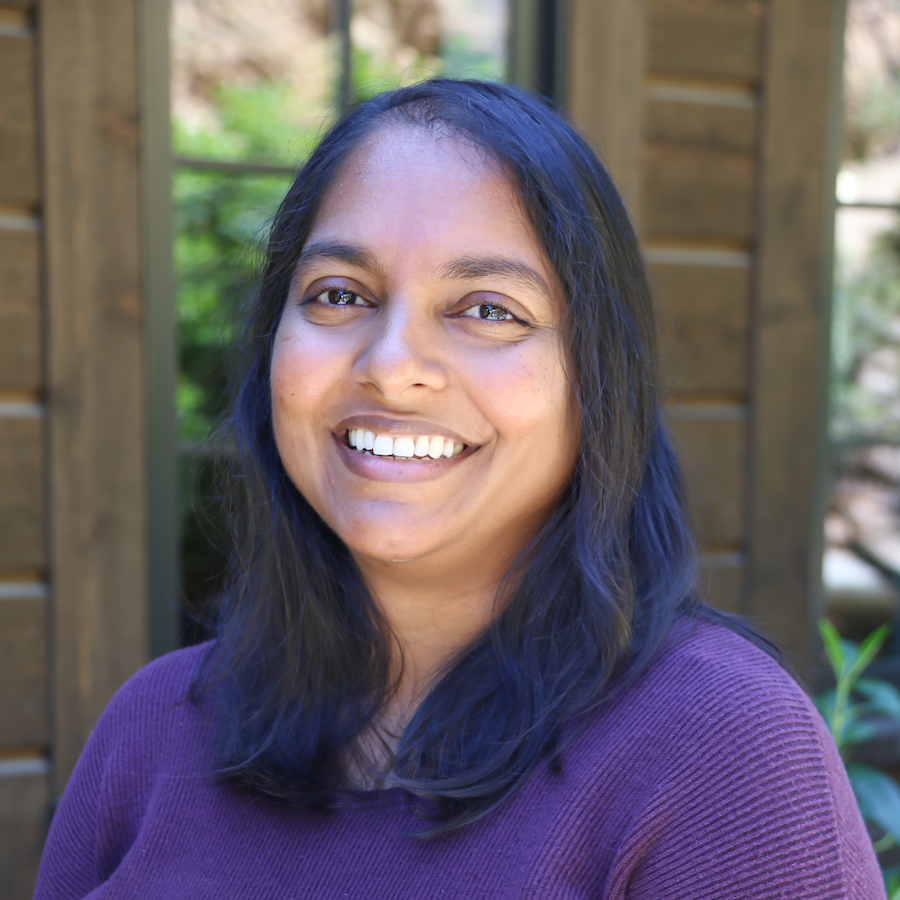One common thread I’ve noticed throughout my conversations is that the most important indicators of success reside within each learner; they reflect their own personal happiness, sense of belonging and accomplishment, and their ability to know their place and purpose in learning.
Dr. Sarojani Mohammed, Research Fellow at Education Reimagined
Dr. Sarojani Mohammed is partnering with the Education Reimagined team as a Research Fellow, pursuing questions of what it will take to establish the learner-centered field as a credible, distinct, and reliable one. As an education researcher and evaluator, Saro fights the injustice of knowledge-hoarding by deeply and meaningfully connecting research and practice to foster the best learning experiences for each learner. Much of her work is shaped by the Just Education Research Design Principles that she developed.
We recently had an opportunity to speak with Saro about the approach she takes in her research and what she will bring to Education Reimagined’s work.
Q: Tell us more about your learner-centered research exploration. What questions are you exploring?
Saro: As the field of learner-centered education continues to evolve, I’m primarily trying to determine what the sector’s needs are for evidence and evidence-building activities. My time is mostly spent pondering, alone and with others, questions like, “What activities would support the field in becoming more established as a credible, authentic, rigorous approach to education?” and “What information does the community — educators, learners, families, and all members of the ecosystem — need and want to understand about how well learner-centered learning environments are working for each person?”
Ultimately, the goal of my fellowship with Education Reimagined is to figure out how we can best support the evolution of this field into a more mature, thriving one.
Q: You bring a justice lens and have specific design principles you use. Tell us how that impacts the work that you do.
Saro: My Just Education Research Design Principles basically takes the notion of the “objective, unbiased, external researcher” and flips it on its head because we all know there’s no such thing as an “objective, unbiased” human — even researchers.
Practically, that means I’m approaching every project from a place of, first and foremost, supporting those who are participating in the research. In this project, those individuals include learner-centered educators (including administrators, policymakers, designers of learning environments, and others), as well as learners and their immediate communities (such as families, employers, faith-based communities, and peers).
Instead of developing a research question and asking the community to engage with me around my question, I’m going to community members and asking them what their questions and their needs are — in this case, specifically around evidence of learner success in a learner-centered environment.
Q: What sparked your interest in advancing the learner-centered field?
Saro: I believe that knowledge hoarding is a form of injustice, and as an education researcher committed to justice, I want to live in a world where all learners have the opportunity to be and do whatever they wish in life. Simply, I want each learner to be able to choose their path after high school graduation based on nothing but their own desire and their own personal definition of a meaningful, fulfilling life. I came to this intention through my own experience — gradually realizing that all of my academic accomplishments had much less to do with how hard I work, and much more to do with where I was born and how the world perceived me. This seems to me to be an injustice. No person’s opportunities should be limited by the color of their skin, their zip code, the language they first learned to speak, or who they identify as in the world. This is why I am committed to learner-centered education, to create a world that is just for each learner.
Instead of developing a research question and asking the community to engage with me around my question, I’m going to community members and asking them what their questions and their needs are.
Dr. Sarojani Mohammed, Research Fellow at Education Reimagined
Q: Why do you think learner-centered research is needed and an important contribution to the field?
Saro: One of the things I find fascinating about humans is how feedback-driven we are. Even when we undertake activities for pleasure or satisfaction, we want to know how well we are doing. In the case of learner-centered environments, individuals who are choosing to engage in learning in this way are doing so because they believe it is better for the learner(s) in their life than conventional education systems.
Learner-centered research dives deeply into that belief, sussing out: Why do individuals believe it is better? Do they continue to believe this as they participate in learner-centered environments? How do they know one way or the other? What more information are they looking for that maybe they can’t get in order to know?
By uncovering, consolidating, and sharing the answers to these questions, the field itself is able to progress. More people become aware of the benefits and challenges of learner-centered education, and those who are already engaging in the field can communicate with each other both inside and outside the field about their successes and the barriers to success they experience.
Q: What are you finding so far?
Saro: One common thread I’ve noticed throughout my conversations is that the most important indicators of success reside within each learner; they reflect their own personal happiness, sense of belonging and accomplishment, and their ability to know their place and purpose in learning. This means that “success” for this community is meaningful and important, but harder to measure in conventional ways. That being said, individuals definitely know it when they see it. In my mind, it’s similar to trying to measure pain — we all know it and can identify it when we’re experiencing it, but it’s harder to communicate to someone else or quantify it, and it often makes little sense to try to compare it to someone else’s experience.
Q: Is there anything else you would like to share?
Saro: It’s been very interesting to delve into these questions at two levels — what are the measures and information that people are using or want to use, versus how do we facilitate the generation and use of that evidence across people, learning ecosystems, regions, and identities. I’ve also had to operate within two paradigms — the existing paradigm we’re in and its current lens into what “evidence-building” and “field-building” is, as opposed to the learner-centered paradigm and its lens into what “evidence-building” and “field-building” could be.
I’m excited about considering the role that can be played in not only supporting structures and processes that facilitate evidence-building and application, but also spaces in which different conceptions of evidence and success are freely discussed and shared openly among individuals communing within the learner-centered paradigm.

